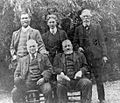Brigg Fair facts for kids
Brigg Fair is a special yearly event held in the English town of Brigg, North Lincolnshire. It has happened every year on August 5th since 1205! Long ago, it was mostly a place where people bought and sold horses. Today, it's still held, but it's much smaller. It's now celebrated more for its history and traditions. This fair is also famous because it's mentioned in an old English folk song.
The folk song "Brigg Fair" (Roud 1083) is a well-known English folk song. Many people know it because of a choral arrangement by Percy Grainger. Later, Frederick Delius created a set of orchestral variations based on it.
Contents
Percy Grainger's Choral Setting
In the early 1900s, a musician named Percy Grainger began collecting folk songs from all over England. He used special wax cylinders to record people singing. He also wrote down the songs.
In 1907, Grainger recorded a singer named Joseph Taylor singing "Brigg Fair." This happened after a music festival in Brigg, North Lincolnshire. You can still listen to this recording today! The British Library made it available online in 2018.
Grainger soon arranged the song for a chorus of five parts, sung without instruments. It also featured a tenor soloist. The original song was quite short because Joseph Taylor only remembered two verses. So, Grainger added three more verses from two other folk songs. These were "Low Down in the Broom" and "The Merry King." The tune of "Brigg Fair" is in the Dorian mode, which sounds a bit thoughtful. However, the words are happy, telling a story about true love.
The song has appeared in different versions. Joseph Taylor and his family members also wrote down some versions. Here are the words that Percy Grainger used:
It was on the fifth of August-er' the weather fine and fair,
Unto Brigg Fair I did repair, for love I was inclined.
I rose up with the lark in the morning, with my heart so full of glee,
Of thinking there to meet my dear, long time I'd wished to see.
I took hold of her lily-white hand, O and merrily was her heart:
"And now we're met together, I hope we ne'er shall part".
For it's meeting is a pleasure, and parting is a grief,
But an unconstant lover is worse than any thief.
The green leaves they shall wither and the branches they shall die
If ever I prove false to her, to the girl that loves me.
Frederick Delius's Orchestral Setting
Frederick Delius heard Percy Grainger's version of "Brigg Fair." He was very impressed by both the tune and how Grainger arranged it. With Grainger's permission, Delius used the song to create a piece for an orchestra. This new work was first performed in 1908.
The piece starts with a peaceful, pastoral introduction. Then, the woodwinds play Grainger's arrangement of the song. After this, Delius creates many different musical variations based on the original tune. The piece ends with a joyful finale. Joseph Taylor, the folk singer, was a guest at the first performance. It's said that he stood up and sang along with the orchestra!
Instruments Used
Delius's orchestral piece uses many different instruments:
- 3 flutes
- 2 oboes
- cor anglais
- 3 clarinets
- bass clarinet
- 3 bassoons
- contrabassoon
- 6 horns
- 3 trumpets
- 3 trombones
- tuba
- timpani
- percussion (like bass drum, triangle, tubular bells)
- harp
- strings (like violins, violas, cellos, and basses)
Images for kids




